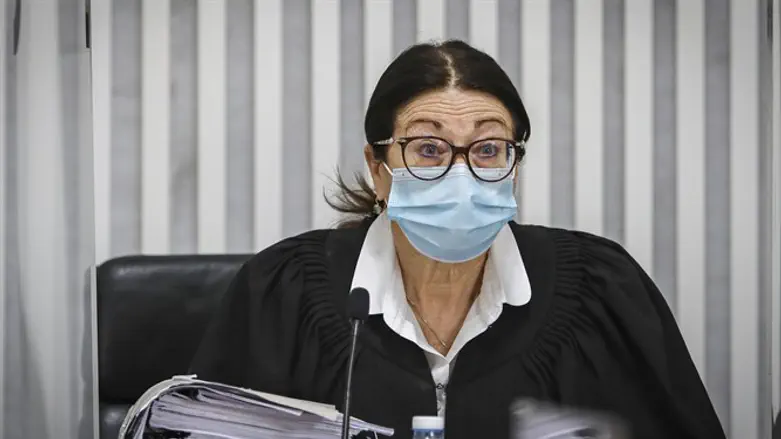
An expanded composition of eleven Supreme Court justices convened this morning for a second consecutive hearing in the series of petitions filed before the Supreme Court against the coalition agreement between the Likud and Blue and White parties.
After the judges yesterday debated whether forming a government may be imposed on Prime Minister Binyamin Netanyahu despite the indictments against him, today the judges discuss clauses in the coalition agreement.
At the beginning of the hearing, Adv. Avital Sompolanski of the Knesset Legal Advisory Board updated that the law to exchange governments is in preparation for second and third reading. On the other hand, the modified Norwegian Law has not yet been placed on the Knesset docket.
In addition, the Chief Justice asked the parties to reduce discussion of legislative moves, including amendments to the Basic Law, and to focus argument on parts of the agreement that do not involve legislation.
Attorney Michael Rabillo is also representing the Prime Minister today, and argued before the judges that no clause in the coalition agreement should be disqualified because it represents a "delicate balance".
"The fact that a government will be set up in a situation that today it needs Court support when any change in the agreement can cause a problem, the entire agreement will collapse. I do not know which clause will lead to this. But it was so difficult to reach this agreement, which is why I ask the Court for restraint, and not to intervene in the agreement,” Rabillo added.
In response to the judge's question on the modified Norwegian Law, Attorney Ravello stated "if Blue and White give it up, we will also."
While the Norwegian Law permits ministers to resign from the Knesset to allow other members of the party list to serve as MKs – while providing ministers the ability to return to the Knesset if they lose their ministry – the modified Norwegian Law would enable ministers resigning from the Knesset to have their seat skip over members of the party list.
The modified Norwegian Law was proposed to ensure that the resignation of ministers for the Blue and White party does not lead to including new MKs from Yesh Atid, which ran on a joint list with Gantz.
Subsequently, the judges strongly attacked the clauses in the coalition agreement that freeze the legislation for the duration of the emergency as well as senior appointments.
Judge Fogelman told Attorney Ravello, "Changing arrangements for senior civil service appointments (State Prosecutor, Attorney General, and Police Commissioner) and a six-month freeze directly sabotages the public interest."
Judge Hendel noted, "It is precisely an emergency such as the coronavirus that is very challenging for the police and requires a permanent and stable appointment of the Commissioner and not like the existing one."
Judge Fogelman noted, "This is not the first time there has been a government attempt to change the rules of the game regarding senior appointments. I'm not currently entering into the question of legitimacy and if it is appropriate, but it's one thing when a government wants a reform in a certain direction, it comes as no surprise, but it doesn't justify such appointments be left unmanned. In the meantime, will the world stop until a committee thinks about changes?"
The lawyer for Blue and White party made it clear in answer to the judges' question that his party did not give up the desire to enact the modified Norwegian Law in accordance with the coalition agreement, although drafting the legislation has not yet begun.
In response, Chief Justice Hayut attacked the initiative and said, "People voted for the list and get skipped over."
After the break, the floor was yielded to the petitioner's representative, Adv. Dafna Holtz-Lechner, who argued that the legislative changes sought by the coalition agreements were illegitimate.
In response, Judge Mazuz wondered, "The agreement doesn't change fundamental rules at all and certainly does not make a regime change. All it is is a statement of intent that should be reflected in the decisions, whether we critique them as legislative or administrative decisions. You come here based on a statement of intent. We're supposed to critique a law that hasn't yet been drafted?"
Attorney Holtz-Lechner replied that the reason why judicial review can already be conducted is that it is already clear that there is a majority supporting the legislation.
Justice Hayut interjected: "If it was unanimous to enact a law for democracy to commit suicide, then in such situations maybe at a pre-legislative stage there's room to intervene, but is this the case?"
Adv. Holtz-Lechner further noted "If we are in the coronavirus era and an emergency period, why decide that if the court criticizes the agreement we go to elections instead of finding an alternate candidate?"
In response, Judge Mazuz stated, "Your allegations are in the public sphere, but we are here in court and you are giving speeches. Do you want us to critique political ramifications?"